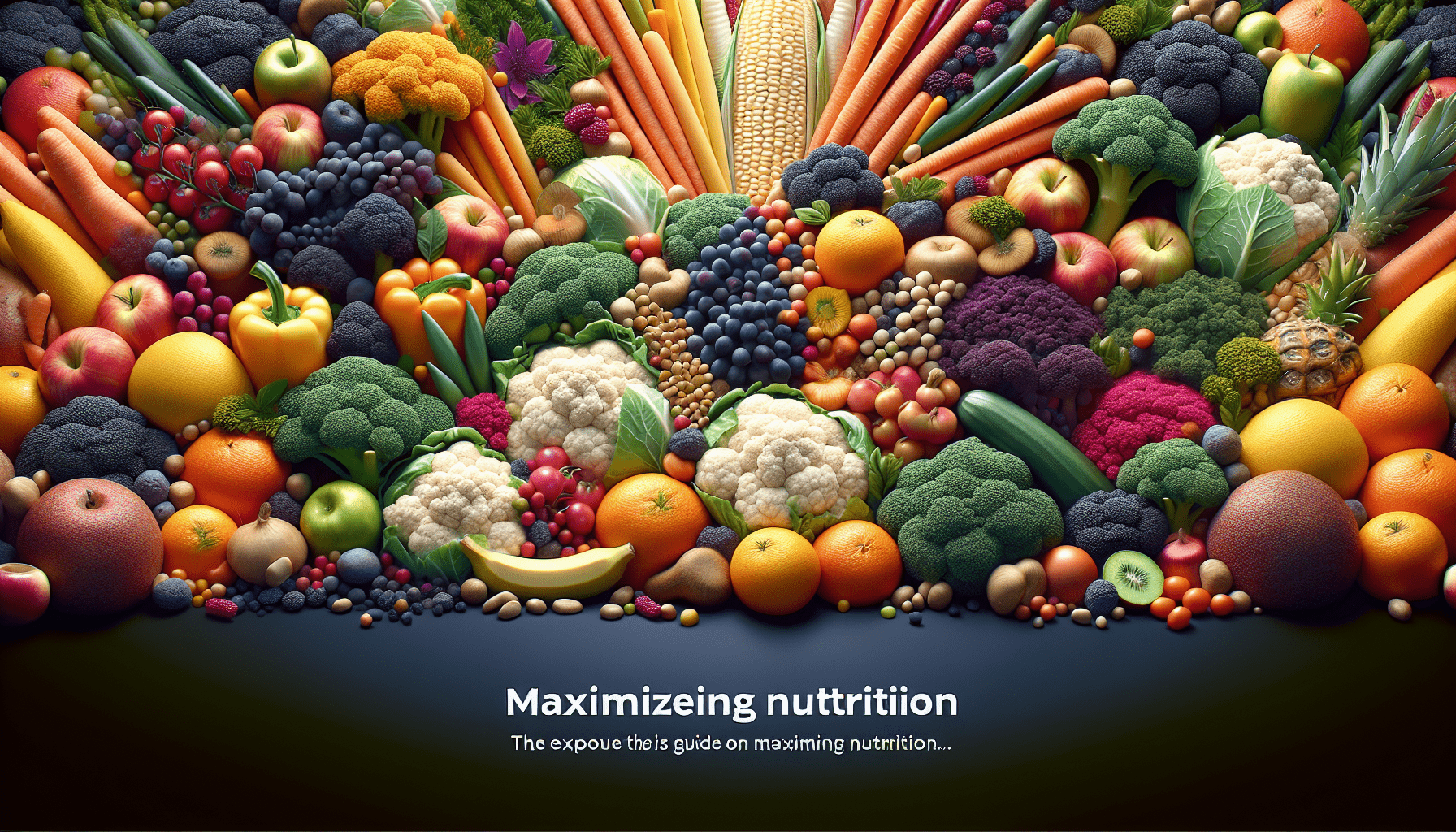In today’s world, where processed and packaged foods often dominate our diets, it’s easy to forget the incredible benefits that whole foods have to offer. Whether you’re a health-conscious individual or simply looking to make positive changes to your eating habits, this guide will take you on a journey of maximizing the nutrition from whole foods. Explore the secrets behind unlocking the true potential of natural, unprocessed ingredients and discover how they can nourish your body and enhance your overall well-being. From fresh fruits and vegetables to whole grains and lean proteins, this article will provide you with valuable insights and practical tips to help you make the most out of your whole food choices. So get ready to embark on this enlightening journey and unlock a world of nutritional benefits from whole foods.

Understanding Whole Foods
What are whole foods?
Whole foods are natural, unprocessed foods that have not been stripped of their nutrients or had any additives or preservatives added to them. They are foods that are as close to their natural state as possible, including fruits, vegetables, whole grains, lean proteins, and healthy fats. Whole foods are typically rich in nutrients, fiber, and antioxidants, making them an essential part of a healthy diet.
Nutritional benefits of whole foods
Whole foods offer numerous health benefits due to their high nutrient content. They provide essential vitamins, minerals, fiber, and antioxidants that support overall well-being. These nutrients play vital roles in maintaining proper bodily functions, such as boosting the immune system, promoting healthy digestion, regulating weight, and reducing the risk of chronic diseases.
Difference between whole foods and processed foods
Processed foods, in contrast to whole foods, have undergone manufacturing processes that may involve added sugars, unhealthy fats, and artificial ingredients. These alterations often lead to a reduction in nutritional value. Whole foods, on the other hand, retain their natural composition, making them a healthier choice for maintaining optimal health.
Importance of Whole Foods in Nutrition
Provides essential nutrients
Whole foods are packed with essential nutrients that our bodies need to function properly. Fruits and vegetables provide vitamins, minerals, antioxidants, and fiber, which are essential for maintaining overall health and preventing nutrient deficiencies. Lean proteins, such as chicken or tofu, provide amino acids necessary for building and repairing body tissues. Whole grains, like quinoa or brown rice, offer complex carbohydrates and fiber for sustained energy and digestive health. Incorporating a variety of whole foods ensures that you are getting a wide range of essential nutrients.
Promotes better digestion
Whole foods, particularly those rich in fiber, play a significant role in promoting healthy digestion. Fiber aids in preventing constipation by adding bulk to your stool and facilitating regular bowel movements. It also helps maintain a healthy gut microbiome by providing nourishment to beneficial bacteria. Whole foods like fruits, vegetables, whole grains, and legumes are excellent sources of dietary fiber that can improve digestion.
Boosts immune system
A strong immune system is crucial for protecting against illnesses and infections. Whole foods, especially those high in vitamins A, C, and E, help bolster our immune defenses. Citrus fruits, berries, leafy greens, nuts, and seeds are all rich in immune-boosting nutrients. Including these whole foods in your diet can enhance your body’s ability to fight off pathogens and stay healthy.
Maintains healthy weight
Whole foods are inherently nutritious and tend to be lower in calories compared to processed foods. This makes them an excellent choice for weight management. Whole foods are often more filling due to their higher fiber and water content, which can help control appetite and prevent overeating. By prioritizing whole foods over processed options, you can achieve and maintain a healthy weight.
Reduces the risk of chronic diseases
Numerous studies have shown that a diet rich in whole foods is associated with a lower risk of chronic diseases, such as heart disease, diabetes, and certain types of cancer. Whole foods provide essential nutrients and antioxidants that promote cellular health, reduce inflammation, and support proper organ function. By incorporating whole foods into your diet, you can significantly reduce your risk of developing these debilitating conditions.
How to Identify Whole Foods
Reading food labels
When selecting food products, reading and understanding the labels is key to identifying whole foods. Look for products with minimal ingredients and no added sugars, artificial flavors, or preservatives. Whole foods will typically have short, recognizable ingredient lists, and their nutrient content should be included on the label. Familiarize yourself with common whole food ingredients to make informed choices.
Choosing fresh and unprocessed foods
Fresh, unprocessed foods are often your best bet when it comes to whole foods. Shop in the produce aisle for a variety of colorful fruits and vegetables. Look for whole grains, such as quinoa or whole wheat pasta, rather than refined grains. Opt for fresh, lean cuts of meat and fish, and choose natural nut butters instead of those packed with added sugars and unhealthy oils. By choosing fresh and unprocessed options, you increase your chances of selecting whole foods.
Shopping in the produce section
The produce section is a goldmine for whole foods. Fresh fruits and vegetables are packed with essential vitamins, minerals, and antioxidants. Aim to fill half your plate with a colorful assortment of fruits and vegetables, including dark leafy greens, vibrant berries, and a mix of cruciferous vegetables like broccoli and cauliflower. Embrace seasonal produce to ensure maximum freshness and nutrient content.
Avoiding packaged and processed foods
To identify whole foods, it is crucial to avoid packaged and processed foods as much as possible. Processed foods are often filled with additives, unhealthy fats, and excessive amounts of salt and sugar. Instead, focus on whole foods that are not pre-packaged or require little to no cooking or processing. By avoiding pre-packaged foods, you can stay closer to nature and choose whole foods that nourish your body.
Maximizing Nutritional Value of Whole Foods
Eat a variety of whole foods
Eating a diverse range of whole foods is essential to maximize your nutritional intake. Each whole food offers a unique combination of vitamins, minerals, and antioxidants. By incorporating a wide variety of fruits, vegetables, whole grains, lean proteins, and healthy fats into your diet, you can ensure that you are receiving a broad spectrum of essential nutrients and maximizing the overall nutritional value of your meals.
Opt for organic and locally sourced foods
Organic and locally sourced whole foods can further enhance their nutritional value. Organic foods are cultivated without the use of synthetic pesticides, fertilizers, or genetically modified organisms (GMOs), which can minimize potential health risks. Locally sourced foods, on the other hand, may be fresher and contain higher nutrient levels due to shorter travel times between farm and plate. Whenever possible, choose organic and locally sourced whole foods to optimize your nutrition.
Cooking methods that preserve nutrients
The way you cook your whole foods can influence their nutritional value. Some cooking methods, such as boiling or deep-frying, can lead to nutrient loss. Instead, opt for cooking techniques that preserve nutrients, such as steaming, baking, grilling, or lightly sautéing. These methods help retain vitamins, minerals, and antioxidants, ensuring that you reap the maximum benefits from your whole foods.
Combining whole foods for enhanced nutrition
Certain whole foods complement each other when it comes to nutrition. For example, pairing foods rich in vitamin C, like bell peppers or citrus fruits, with iron-rich foods, like spinach or lean meats, can enhance iron absorption. Similarly, consuming healthy fats, such as avocado or olive oil, alongside fat-soluble vitamins found in foods like carrots or sweet potatoes, can aid in their absorption. By strategically combining whole foods, you can optimize nutrient absorption and maximize their nutritional impact.
Using spices and herbs
Spices and herbs not only add flavor to your meals but also offer additional nutritional benefits. Many herbs and spices, such as turmeric, cinnamon, ginger, and garlic, have potent anti-inflammatory and antioxidant properties. Including these seasonings in your dishes can enhance the nutritional value of your whole foods while making them delicious. Experiment with different herbs and spices to discover new flavors and maximize the benefits they bring to your meals.

Key Nutrients Found in Whole Foods
Protein
Protein is an essential nutrient found in whole foods that supports various bodily functions, including the growth and repair of tissues, the production of enzymes and hormones, and the maintenance of a healthy immune system. Whole food sources of protein include lean meats, fish, eggs, dairy products, legumes, and plant-based protein options like tofu or tempeh. Incorporating protein-rich whole foods into your diet can help support muscle development, promote satiety, and aid in weight management.
Carbohydrates
Carbohydrates are the body’s primary source of energy. Whole food sources of carbohydrates, such as fruits, vegetables, whole grains, and legumes, provide essential vitamins, minerals, fiber, and antioxidants, along with sustained energy. Choose complex carbohydrates, found in whole grains and starchy vegetables, over refined and processed carbohydrates, like white bread or sugary snacks, to maintain stable blood sugar levels and support overall health.
Healthy fats
Healthy fats are a crucial component of a balanced diet, providing energy, assisting in the absorption of fat-soluble vitamins, and supporting brain function. Whole food sources of healthy fats include avocados, nuts, seeds, olive oil, and fatty fish like salmon or mackerel. These fats contain omega-3 fatty acids, which have been associated with a reduced risk of heart disease and inflammation. Including healthy fats in your diet can promote a healthy heart, brain, and overall well-being.
Fiber
Fiber is an essential nutrient found in whole foods that plays a significant role in digestive health, weight management, and blood sugar regulation. Whole foods like fruits, vegetables, whole grains, legumes, and nuts provide both soluble and insoluble fiber. Soluble fiber helps lower cholesterol levels and stabilize blood sugar, while insoluble fiber adds bulk to your stool and promotes regular bowel movements. By including fiber-rich whole foods in your diet, you can support a healthy digestive system and maintain optimal health.
Vitamins and minerals
Whole foods are abundant in vitamins and minerals, which are essential for overall health and well-being. Fruits and vegetables are particularly rich in vitamins A, C, and E, as well as various minerals like potassium, magnesium, and folate. Whole grains provide a range of B vitamins, while lean proteins offer important minerals such as iron and zinc. By consuming a diverse selection of whole foods, you can ensure that you are obtaining a wide array of essential vitamins and minerals necessary for optimal functioning.
Meal Planning with Whole Foods
Designing balanced meals
Designing balanced meals with whole foods involves incorporating a variety of nutrient-dense ingredients from different food groups. Aim to include a protein source, such as lean meat, fish, legumes, or tofu, along with a variety of colorful fruits and vegetables. Add a serving of whole grains, such as quinoa or brown rice, to provide carbohydrates and fiber. Don’t forget to include a source of healthy fats, like avocado or olive oil, to complete your meal. Building balanced meals ensures that you receive the necessary nutrients and energy from whole foods.
Incorporating whole foods into breakfast, lunch, and dinner
Incorporating whole foods into every meal is essential for maximizing your nutrition. For breakfast, you can enjoy whole grain oatmeal topped with fresh berries and a sprinkle of nuts for added protein and healthy fats. At lunch, a colorful salad with mixed greens, grilled chicken, and a variety of vegetables can provide a nutrient-packed meal. For dinner, consider having a stir-fry with tofu or shrimp, loads of veggies, and brown rice or whole wheat noodles. By including whole foods at each meal, you can optimize your nutrient intake throughout the day.
Snack ideas using whole foods
Snacks are a great opportunity to incorporate whole foods into your diet. Munch on carrot sticks or sliced bell peppers with hummus for a satisfying and nutrient-rich snack. Greek yogurt topped with fresh berries and a drizzle of honey is another nutritious and delicious option. For a quick and easy snack on the go, grab a handful of nuts or seeds, or pack a piece of fruit to enjoy between meals. These whole food snacks provide important vitamins, minerals, and antioxidants to keep you fueled and satisfied.
Meal prepping with whole foods
Meal prepping can be an effective way to ensure that you have access to whole foods throughout the week, even during busy days. Dedicate a specific time each week to plan and prepare your meals in advance. Chop vegetables, cook whole grains, and batch cook proteins like grilled chicken or roasted salmon. Portion out meals into containers for easy grab-and-go options. By meal prepping with whole foods, you can save time, eat healthier, and avoid relying on processed convenience foods.

Whole Foods for Specific Health Benefits
Foods for heart health
Numerous whole foods contribute to heart health by reducing the risk of heart disease and supporting cardiovascular function. Incorporate foods rich in omega-3 fatty acids, such as fatty fish, flaxseeds, and walnuts, to promote heart health. Include fiber-rich whole grains, like oats and barley, to lower cholesterol levels, and consume plenty of fruits and vegetables for their valuable antioxidants. By incorporating these whole foods into your diet, you can prioritize heart health and decrease your risk of cardiovascular problems.
Foods for brain health
Certain whole foods are known for their ability to support brain health and cognitive function. Blueberries, rich in antioxidants, have been linked to improvements in memory and learning. Fatty fish, like salmon and sardines, contain omega-3 fatty acids that support brain health. Dark leafy greens, such as spinach and kale, are packed with nutrients that nourish the brain. Regularly consuming these whole foods can provide the nutrients needed to keep your brain sharp and healthy.
Foods for bone health
Maintaining strong bones is essential for overall health and the prevention of osteoporosis. Whole foods rich in calcium, such as dairy products, leafy greens, and fortified plant-based milk, can support bone health. Vitamin D, found in fatty fish, egg yolks, and fortified foods, helps the body absorb calcium effectively. Additionally, foods high in magnesium, like nuts, seeds, and legumes, contribute to bone health. By including these whole foods in your diet, you can optimize your bone health and reduce the risk of fractures and osteoporosis.
Foods for gut health
A healthy gut is essential for overall well-being and proper digestion. Whole foods that support gut health include fermented foods like yogurt, kefir, sauerkraut, and kimchi. These foods contain beneficial bacteria that help maintain a healthy balance of gut flora. Foods rich in fiber, such as fruits, vegetables, and whole grains, nourish the good bacteria in your gut and improve digestion. By incorporating these whole foods into your diet, you can support a healthy gut and overall digestive wellness.
Foods for skin health
Consuming whole foods that support skin health can promote a radiant and youthful complexion. Fruits and vegetables rich in antioxidants, such as berries, citrus fruits, and dark leafy greens, can protect the skin against oxidative stress and premature aging. Healthy fats found in avocados, nuts, and seeds contribute to skin health by providing essential fatty acids and moisturizing properties. Drinking an adequate amount of water and staying hydrated is also crucial for healthy skin. By incorporating these whole foods into your diet, you can nourish your skin from within and achieve a healthy, glowing complexion.
Challenges and Solutions
Affordability of whole foods
While some whole foods can be more expensive than processed foods, there are several strategies to make them more affordable. Shop for whole foods in season, as they tend to be priced more competitively. Buying in bulk and freezing excess portions can also help save money. Additionally, consider growing your own fruits, vegetables, and herbs if you have space and resources. With some planning and budgeting, incorporating whole foods into your diet can be more affordable than you might think.
Limited availability of fresh produce
Availability of fresh produce can vary depending on location and season. When fresh produce is limited, consider using frozen fruits and vegetables as they retain much of their nutritional value. Canned options, like beans or tomatoes, can also be a convenient and cost-effective alternative. If fresh produce is scarce, explore local farmers’ markets or community-supported agriculture programs, which often offer a diverse selection of locally sourced, fresh whole foods.
Time constraints and convenience
In our fast-paced lives, time constraints can make it challenging to prepare whole foods from scratch. However, there are solutions to make whole foods more convenient. Consider meal prepping on weekends, so you have ready-made meals and snacks throughout the week. Prepare larger batches of staple foods like grains or soups and freeze them in individual portions for quick and easy meals. Utilize kitchen gadgets like slow cookers or instant pots to simplify the cooking process. By incorporating these time-saving strategies, you can make whole foods more convenient and manageable.
Overcoming taste preferences and cravings
Taste preferences and cravings for unhealthy foods can make it challenging to incorporate whole foods into your diet. However, with experimentation and creativity, you can find whole food alternatives that satisfy your taste buds. Try cooking whole foods using different herbs, spices, and seasonings to enhance flavors. Experiment with various cooking methods to find the most enjoyable way to prepare your meals. Gradually introduce whole foods into your diet, replacing processed items one by one. Over time, your taste buds may adjust, and you may find yourself craving whole foods instead.

FAQs about Whole Foods Nutrition
What is the recommended daily intake of whole foods?
There is no specific recommended daily intake of whole foods since everyone’s nutritional needs vary. However, a general guideline is to aim for a well-balanced diet that includes a variety of whole foods from all major food groups. Make whole foods the foundation of your meals and snacks, ensuring that you are consuming a diverse range of fruits, vegetables, whole grains, lean proteins, and healthy fats. Consulting with a registered dietitian can provide personalized recommendations based on your individual needs and goals.
Can whole foods be frozen or canned?
Yes, whole foods can be frozen or canned. Freezing is an excellent preservation method that retains much of the nutritional value of whole foods. Frozen fruits and vegetables are a convenient option when fresh produce is not readily available. Canned whole foods, such as beans, tomatoes, or fish, can also be nutritious choices. However, be mindful of added sugars or high sodium content in some canned products. Choose low-sodium or no-salt-added options and rinse canned foods before consuming to reduce sodium intake.
Are whole foods suitable for people with dietary restrictions?
Whole foods can be suitable for people with various dietary restrictions, as long as they choose whole foods that align with their dietary needs. For example, individuals following a gluten-free diet can consume whole grains like quinoa, brown rice, or millet. Plant-based eaters can find excellent sources of protein from legumes, tofu, and tempeh. It’s essential to identify any specific dietary restrictions and consult with a healthcare professional or registered dietitian to ensure that your nutritional needs are being met.
How do whole foods compare to supplements?
Whole foods are generally a preferred source of essential nutrients compared to supplements. While supplements can be useful in certain cases, whole foods provide a wide range of vitamins, minerals, fiber, and antioxidants in their natural form. Whole foods contain other beneficial compounds that work synergistically with the nutrients, supporting optimal health. It’s important to remember that supplements should not replace a balanced diet but may be necessary in specific situations or with guidance from a healthcare professional.
Can I still eat processed foods in moderation?
While whole foods should be the foundation of a healthy diet, enjoying processed foods in moderation is acceptable. The key is to prioritize whole foods for the majority of your meals and snacks while incorporating processed foods as occasional treats. When consuming processed foods, be mindful of portion sizes and read labels to choose options with minimal additives, added sugars, and unhealthy fats. Sustainable and long-term healthy eating habits involve finding a balance that allows for enjoyment and nourishment from both whole and processed foods.
Conclusion
Understanding the benefits of whole foods is essential for maximizing nutrition and promoting overall health. Whole foods provide essential nutrients, support digestion, boost the immune system, aid in weight management, and reduce the risk of chronic diseases. By learning how to identify whole foods, maximizing their nutritional value, and incorporating them into meal planning, you can optimize your diet. Specific whole foods also offer unique health benefits, such as supporting heart health, brain function, bone health, gut health, and skin health. Despite potential challenges, such as affordability, limited availability, time constraints, taste preferences, and cravings, there are solutions to help overcome these barriers. It’s important to consult with a healthcare professional or registered dietitian to receive personalized advice to meet your individual nutritional needs. By incorporating more whole foods into your diet, you can unlock their benefits and embark on a journey of nourishing your body from within.

Related Content
- 10 Powerhouse nutrient rich organic snacks to Energize Your 2025 Diet
- The Ultimate Guide to Whole Food Nutrition for Health in 2025: 10 Effective Tips
- Ultimate Guide to 10 Effective Organic Raw Diet Nutrition Strategies for 2025
- 10 Effective nutrient dense organic recipes to Boost Your Health in 2025
- Why Organic Milk and Dairy Products Are Superior





